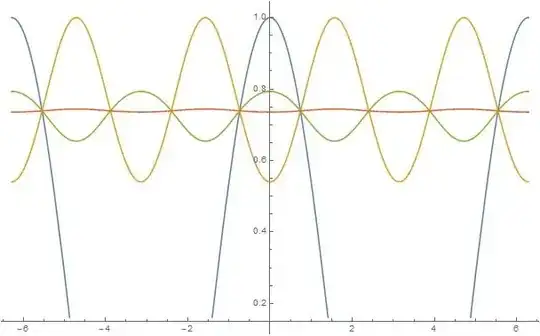I was wondering if there is any way to evaluate a general closed form solution to the following integral for all $n\in \mathbb{N}$. $$I_n=\int_0^{\pi/2} \underbrace{\cos(\cos(\cos(\dots(\cos}_{n \text{ times}}(x))\dots)))~dx \tag{1}$$
I have already evaluated closed forms to this integral for certain values of $n$, however I am still missing a closed form for a large number of values of $n$. Those in $\color{red}{\text{red}}$ I numerically evaluated, meaning that I currently do not have a closed form for them. $$\begin{array}{c|c}n&I_n\\\hline0&\dfrac{\pi^2}{8}\\1&1\\2&\dfrac{\pi J_0(1)}{2}\\\color{red}{3}&\color{red}{\approx 1.11805}\\\color{red}{4}&\color{red}{\approx 1.18186} \\ \color{red}{5} & \color{red}{\approx 1.14376} \\ \color{red}{6}&\color{red}{\approx 1.17102}\\\color{red}{\vdots}&\color{red}{\vdots}\\\infty&\alpha\cdot \dfrac{\pi}{2} \approx 1.16095\end{array}$$ Where $J_p(\cdot )$ is the Bessel function of the first kind, and $\alpha$ is the Dottie Number. The cases $n=0$ and $n=1$ are trivial, hence I will not show how I derived these solutions. Hence, I will show how I derived the case where $n=2$ and $n\to \infty$.
Evaluating $I_2$: i.e $\int_0^{\pi/2} \cos(\cos(x))~dx$.
Introducing the definition of the Bessel Function of the first kind: $$J_{\beta}(z)=\frac{1}{\pi}\int_0^{\pi} \cos(z\sin{\theta}-\beta \theta)~d\theta$$ We can use the substitution $\theta=u+\frac{\pi}{2}$ to obtain:
$$\begin{align} J_{\beta}(z)&=\frac{1}{\pi}\int_{-\pi/2}^{\pi/2} \cos\left(z\sin\left(u+\frac{\pi}{2}\right)-\beta\left(u+\frac{\pi}{2}\right)\right)~du\\&=\frac{1}{\pi}\int_{-\pi/2}^{\pi/2} \cos\left(z\cos(u)-\beta\left(u+\frac{\pi}{2}\right)\right)~du \end{align}$$ To get it into a similar form to our case, notice that we can let $\beta=0$ and $z=1$. Therefore: $$J_0(1)=\frac{1}{\pi}\int_{-\pi/2}^{\pi/2} \cos(\cos(u))~du$$ At first sight, it may seem like the bounds are problematic. However, note that $f(x)=\cos(\cos(x))$ is an even function, hence we know that: $$J_0(1)=\frac{2}{\pi}\int_0^{\pi/2} \cos(\cos(u))~du \iff \int_0^{\pi/2} \cos(\cos(u))~du=\frac{\pi J_0(1)}{2}$$
Evaluating $\lim\limits_{n\to \infty} I_n$:
I realized that as $n\to \infty$, the integrand will converge to a constant function for all $x\in \mathbb{R}$, as shown below. The blue, yellow, green and red curves is when $n=1,2,5,10$ respectively.
I figured that we can represent the repeated composition of functions by the following recurrence $x_{n+1}=\cos(x_n)$. Using the principles of fixed point iteration, we know thus know that the value it tends to is the unique solution to $x=\cos(x)$. This turns out to be the Dottie Number, which I evaluated numerically using the Newton-Raphson Method and denoted this value by $\alpha$. I obtained: $$\alpha\approx 0.739085133215161$$ Hence: $$\lim_{n\to \infty} I_n=\int_0^{\pi/2}\cos(\cos(\cos(\dots(\cos(x))\dots)))~dx=\alpha\cdot \frac{\pi}{2} \approx 1.160952212443092$$
As mentioned, I am unsure how to evaluate closed forms for the cases when $n\geq 3$. I've checked some other definitions such as the Struve function $\mathbf{H}_{\gamma}(\cdot)$, though it only seems to be useful when evaluating $\int_0^{\pi/2} \sin(\sin(x))~dx$, which is not the integral we are considering. Hence, I would appreciate some guidance on how to evaluate a general closed form for $(1)$ for all $n\in \mathbb{N}$, if possible.

N[RealInverseSphericalBesselY[0, -1, 1]]gives: $0.739085$ – Mariusz Iwaniuk Sep 30 '23 at 11:11RealInverseSphericalBesselY[n, t, b]means you consider $n$ as the order of the inverted function $y_n$, $t$ as the value of $y_n$, and $b$ is the branch number of the countably infinite branch numbers of the inverse. So here one essentially asks Mathematica to solve $\cos(x)=x$. – projectilemotion Oct 01 '23 at 08:54RealInverseSphericalBesselYworks withAskConstants 5.0packages from here: https://math.hawaii.edu/~dale/AskConstants/AskConstants.html – Mariusz Iwaniuk Oct 01 '23 at 09:04